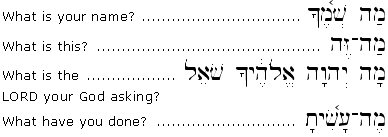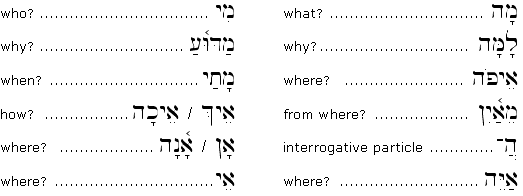|
Hebrew Interrogative Pronouns
English Grammar
In English, an interrogative pronoun is used to ask a question about an antecedent. Often the antecedent is unknown, which is precisely why the question is being asked in the first place. The most common interrogative pronouns are "who/whom" "what," "that/which," "where," "when," "how," and "why." For example:
- Who said that?
- What did you say?
- Where is David?
- What is her phone number?
In each of these cases, the interrogative pronoun is used to ask for information about the antecedent.
Hebrew Grammar
In Hebrew, interrogative pronouns are likewise used to ask questions about antecedents. The most common of these are the words who? (mi) and what? (mah). Fortunately these words are not inflected for gender, number, or case, which means that once you learn the meaning of the Hebrew word, you're done.
Examples: Mi?

In each sentence above, mi (who) is used to ask a question about the antecedent. Notice that we supply a linking verb in English for our translations. In the Scriptures, mi is uninflected but may sometimes take a maqqef.
Examples: Mah?

In each sentence above, mah (what) is used to ask a question. Note again that we supply the linking verb for our English translations. In the Scriptures, mah is uninflected but may take a maqqef. In addition, the first letter of the word following mah will take a dagesh forte, unless it is a guttural (in which case the vowel in mah will shorten from Qamets to either Patach or Segol).
Examples: Other interrogatives

The Interrogative Prefix
In Hebrew, a question that implies a "yes" or "no" answer is normally posed by placing a Hey (with a Chateph Patach) prefix on the first word of the sentence. Since this Hey prefix can be mistaken for a definite article, when you see a Hey on the front of a word, don't just assume that it is the definite article: Look more carefully and see if it might be the interrogative Hey.
Compare:

Notice that the Hey prefix in the second sentence converts the sentence from a declarative sentence to a question.
In most cases, the Hey prefix will take the Chateph Patach vowel, though before gutturals or a vocal Sheva, the Hey will take Patach (and before a guttural that has a Qamets, the Hey will take a Segol). For example:

The important thing to remember here is that in some cases the Hey at the start of a word might not be the definite article, but rather an "interrogative particle." Context (and cross-checking your translation) is the key to discerning the particular usage.
Section Exercises
- Memorize the section vocabulary (top of the page).
- Write out some simple examples to help you recall the rule for the interrogative prefix.
- Find examples in your Hebrew Tanach that use these interrogative pronouns.
<< Return
|








